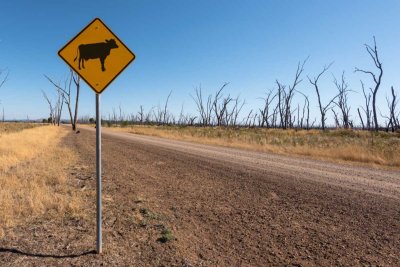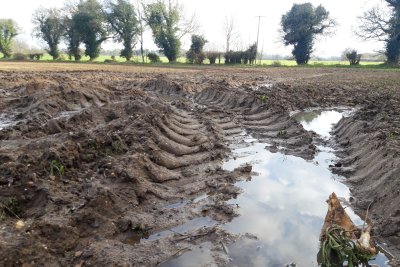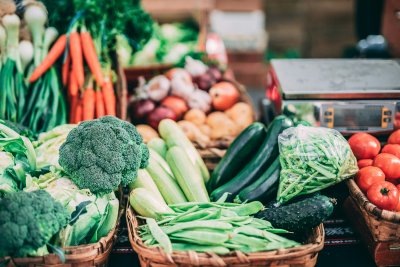Blogs • Good Food Trade Campaign
Government has laid the UK-Australia trade deal before Parliament - here are some key questions
As the first new trade deal negotiated by the UK after leaving the European Union, we present our key questions and analysis for parliamentarians, who will need to assess both the impact of this deal and the implications it may have for future ones.

The Government has today (16 June 2022) laid the UK-Australia free trade agreement (FTA) before Parliament, triggering a period of parliamentary scrutiny. Below are the key questions we would like parliamentarians to put to the Government during this period. They are based on the Trade and Agriculture Commission advice to the Department of International Trade on the UK-Australia trade agreement and the evidence given to Parliament by the Chair of the commission, Professor Lorand Bartels. We also provide our view on the TAC advice.
Questions for Parliament to put to the Government
1. The TAC advice made clear there were legitimate concerns about Australia’s use of pesticides and genetically modified oils giving Australian farmers an unfair competitive advantage over UK farmers. How does the Government intend to protect UK producers and consumers from these products, some of which are banned in the UK?
2. Is it fair that the TAC advice compares differences between statutory protections in the UK with voluntary action in Australia? And what in particular might this mean with future deals with countries where high antibiotic or pesticide usage is common in produce that might be increasingly imported and might undercut the voluntary action of UK farmers?
3. The TAC advice flagged that there is some uncertainty in the FTA text drafting around the ‘science based’ approach in the SPS agreement. The Chair said the drafting does not make clear if it allows for the precautionary principle to be applied – how does the Government intend to fix this?
4. Should the UK limit itself to considering obligations or restrictions of international trade law, or should it take responsibility for environmental harms of its food production, regardless of where it’s grown/produced?
5. Professor Bartels told the EFRA Committee that FTA also establishes mechanisms whereby the UK may treat Australian regulations and assessment procedures as ‘equivalent’ to its own, even when they differ in certain respects, as long as they provide the same measures of ‘protection’. How does the Government intend to take decisions on how equivalence is to be established and agreed?
6. Professor Bartels told the EFRA Committee that he had had to hire additional research capacity with university funds. How will the Government ensure the Commission is adequately resourced in future to deliver on the scrutiny task it has been set? (This will become especially pertinent as the UK considers joining the CPTPP which already has 11 member states with differing agricultural systems, regulations and languages.)
7. Professor Bartels flagged the need for the UK’s import control systems to be properly resourced to be able to manage increased imports under the FTA. However, when questioned at EFRA, he made clear that existing border arrangements were not his area of expertise. How will the Government ensure that our border controls are adequately resourced and implemented?
8. Human health was dropped from the remit of the Trade and Agriculture Commission. The scrutiny arrangements around the impact of this deal on human health have been less transparent and on a different timetable. We and our partners have raised these concerns with the Secretary of State for International Trade. How will the Government reassure the public that this deal will not adversely impact on human health both in the short and longer term?
9. Given three separate sets of advisers (National Food Strategy, Committee on Climate Change and the first Trade and Agriculture Commission) have all recommended the Government produce a set of core standards and Professor Bartels made clear there was nothing to stop the Government doing that, can the Government say when it will do this, and if not, why not?
10. The TAC advice says that the UK could take decisions under the terms of the agreement that could constrain its freedom to regulate in the future – how will the Government ensure that does not happen?
11. Are Parliamentarians satisfied that the current border checks are adequate to identify foodstuffs that have been produced with inputs that might be banned here and/or that contain residues? And are they also satisfied that the border agencies are adequately resourced to cope with additional numbers of checks on imports from new trading partners?
TAC Report analysis
When the SoS for International Trade commissioned its advice, she set the Commission three technical, legal questions. Below we provide summaries of the report’s findings, further relevant information from committee evidence and our view on these.
Will the FTA require the UK to change its levels of statutory protections in relation to animal or plant life or health, (b) animal welfare, and (c) environmental protection?
The report found: “the FTA does not require the UK to change its existing levels of statutory protection in relation to animal or plant life or health, animal welfare, and environmental protection.” (So, for example, this means the UK will not need to accept imports of beef or milk from cows treated with growth hormones as a result of this deal.)
When giving evidence to the House of Commons Professor Lorand Bartels said:
The Commission Chair told the International Trade Select committee that the existing UK ban on hormone beef was based on a 1998 WTO case and “we cannot say that the beef hormone ban is necessarily legal…but we also cannot say that it is necessarily illegal.” The UK-Aus free trade agreement states that any Sanitary and Phytosanitary (SPS) measures will be based ‘on science’. We know that Canada, for example, has said that market access for hormone beef is “legitimate and appropriate and should be forthcoming".
In his evidence to the EFRA Committee, the Chair said that the Commission had rejected concerns on a number of grounds including that the product was unlikely to be traded or that the FTA wouldn’t increase the imports. He also said: “We did not want to just compare the law in Australia, which is more flexible in many cases than in the UK…We wanted to look at what the farming practices in Australia are, not what they are required to be. In the UK, practices are largely regulated by law, but not entirely. In fact, there are voluntary schemes that go further and interestingly, those are often not referred to in the evidence because that would then be an apple-to-apple comparison.”
He concluded that there were two areas of concerns raised by stakeholders that were legitimate in the case of the Australia FTA which were: pesticides and GM oils.
The Chair also conceded that there had been a different level of scrutiny over pesticide and GM usage as “a lot of this would make research projects of their own”. He also said that when it came to assessing residue levels of pesticides, for example, that might be harmful to health in the UK, “the UK’s border controls operate as normal when it comes to that.”
Sustain view
In our view the comparisons made by the Commission are unequal – voluntary in Australia versus statutory in UK which it said “typically involve higher standards” and which have value, “first of all to consumers, who are interested in whether products are made according to these conditions, and, secondly, to producers (and others in the value chain), who have a commercial incentive to produce according to these standards.”
We feel that this is particularly relevant in the area of antibiotic stewardship, as much progress in the UK has been made voluntarily by UK farmers and this progress may be undermined by unfair competition from produce that has a lower standard approach, giving it a cost advantage.
Research from the Alliance to Save Our Antibiotics shows much higher antibiotic usage in Australia in pigs and poultry, which are not included in this FTA. Surveillance is poorer in Australia so the Alliance was unable to make an assessment of usage in cattle and the TAC report did find Australian beef in scope on the grounds that it could be anticipated that imports might increase as a result of this FTA however, antibiotics were not mentioned. But we know that in Australia antibiotics not used in human medicine are still permitted to promote growth – a practice banned in the UK.
Does the FTA reinforce the UK’s levels of statutory protection in these areas?
The report found the FTA reinforces “the UK’s ability to maintain its levels of statutory environmental and animal welfare protection in 2 main ways: first that the UK not only has a right to maintain its statutory protections, but it has an obligation to do so, in certain cases” and that the “UK is able to protect its levels of statutory protection indirectly by ensuring that Australia does not gain a trade advantage by lowering Australian standards of protection, in certain cases, or not properly implementing its domestic laws.”
The report did find that the UK is able to commence dispute settlement proceedings if Australia fails to abide by its commitments in the environmental obligations chapter, but not in the animal welfare chapter (and that concerns in this area would need to be raised via the Animal Welfare Working Group).
With regard to the potential impact on climate change, the report said: “While this is still untested, it is likely that the UK is entitled under WTO law, and the FTA, to restrict trade in order to combat climate change, to the extent that this can be seen as conserving an ‘exhaustible natural resource’ which is either a UK natural resource or part of the global commons.”
In the House of Commons the TAC Chair Lorand Bartels said:
That there is a difference between actions taken in Australia that impact Australia alone and those that might impact on human, animal or plant life in the UK. “What goes on with the Australian environment is not a public morals issue. If the Australians want to destroy one of their rivers, they can—you might not like it, but they can. It is of no concern to the UK whether Australia kills off one of its rivers; that’s an entirely sovereign question of Australia.”
However, he did go on to say “The starting point, under WTO law, is that it [destroying the environment in Australia] is of no concern to the UK. The FTA makes that to some degree the concern of the UK. You could argue that it is not as fleshed out as it might be, but it says that when you have Commonwealth law—so Australian federal law—on an environmental issue, which is defined in a relatively limited way in the agreement, and Australia fails to implement that law in order to obtain a trade advantage, the UK is allowed to take legal action. So there is a narrow area of control where the UK can prevent the practices you mentioned—rampant use of pesticides in violation of Australian law, or not implementing Australian law.”
Sustain view
UK consumers are increasingly sophisticated about understanding the global impact of the food they eat. While Professor Bartels may be correct about the remit of international law permitting Australia sovereignty over the impact of Australian food production on humans, plants and animals there, it is our view that the UK has a responsibility not to export harms from food production – particularly when those harms have a global reach, such as through nature loss, species reduction or climate change. We are pleased that the report recognises that trade in produce which could contribute to accelerating climate change could be contested.
Does the FTA otherwise affect the ability of the UK to adopt statutory protections in these areas?
The report found that: “The FTA does not otherwise affect the ability of the UK to adopt statutory protections in the areas covered. It does not restrict the UK’s WTO rights to regulate in these areas, and even enhances these rights in some respects. However, the UK is able to adopt decisions under the agreement, together with Australia, that may constrain its freedom to regulate in the future, and it important to ensure that the UK’s import control systems are properly resourced to be able to manage increased imports under the FTA.”
At Select Committee Lorand Bartels said:
When questioned specifically about pesticides at EFRA Professor Bartels said: “We raised a flag to say that, to the extent that there is likely to be an increased quantity of imports from Australia of products that are made with pesticides— particularly those that might not be authorised for use in the UK—there needs to be sufficient resource to perform the checks.” He continued: "We thought it was enough…to make sure that the checks happen. I was not aware that the checks are not happening at the moment.”
Sustain view
Three sets of national advisers (first TAC, the National Food Strategy and the Committee on Climate Change) have recommended that the Government adopt core standards and the Government has chosen to ignore their advice. More than 2.2million people in 2020 signed petitions calling for their food standards to be protected in law. The TAC found two areas of existing standards that could be lowered (pesticides and Genetically Modified food) and has indicated that there is a possibility the UK’s freedom to regulate in the future might be hampered. There are also clear concerns that assumptions were made about the current level of border checks and the Committee called for adequate resourcing.
Published Thursday 16 June 2022
Good Food Trade Campaign: Campaigning for good trade that benefits people and the planet at home and overseas.





